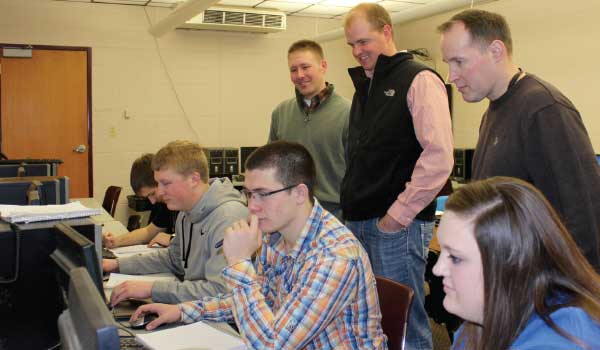
Game of Chance Leads to Real Learning
At face value, it’s a simple game. High school students use imaginary money to start and operate a mock business in the swine industry. The reality is much greater – students earn better understanding of what it takes to run a successful pork business.
“We give them $100,000 to start so they have purchasing power,” says Cody McKinley. “We bring in other producers and resources throughout the semester to help them along the way, but the key is their level of ambition.”
The game uses real-time markets, but is accelerated so each week represents one month making the semester-long class represent a “year” of operation for their business. McKinley (’07 agricultural business) and Ben Isaacson (’06 animal science, ’09 MS) created the Swine Simulation Game at North Linn high school in Tom Murray’s (’94 agricultural and life sciences education) agricultural business class.
Both McKinley, public policy director for the Iowa Pork Producers Association and Isaacson, farm manager and appraiser with Agri-Management Services, are graduates of North Linn. They created the game in 2009. The game includes lessons on buying and selling commodities, applying for loans, making decisions on animal welfare including genetics, nutrition and management protocols and more.
“We’ve had farrow to finish, farrow to wean, niche market, show pigs, a gilt multiplier, spot market buying – a little bit of everything,” says Isaacson.
“Even though the students are in FFA, most have never had a hands-on experience with a farming operation,” says Murray. “Their knowledge level increases 90 to 100 percent by the end of the semester.”
McKinley and Isaacson develop “chance” cards with unexpected scenarios students must incorporate into their plans.
“One year the chance card was a building fire,” says Isaacson. “One of the students chose not to purchase insurance for his operation. It was the perfect example of how this game is beneficial—we had a 17-year-old learning the value of insurance.”
McKinley, Isaacson and other college alumni provide the winner of the game a $500 scholarship. They double the scholarship if a student attends Iowa State University. Three of six of the winners have chosen to attend Iowa State.
The students involved in the class are surveyed on their knowledge of basic finance and the agriculture industry at the beginning and end of the semester. “The results are dramatic, and prove this template works,” says Isaacson. “The ultimate goal would be to grow this curriculum to be included in other FFA programs,” says McKinley. “We want to help the next generation of agriculturalists.”



